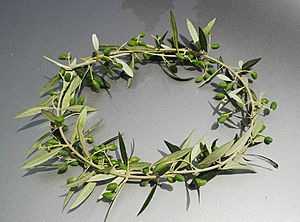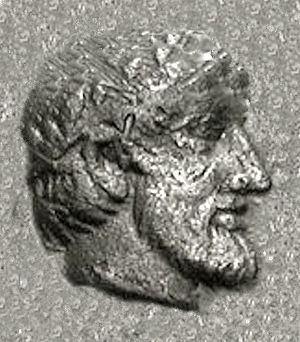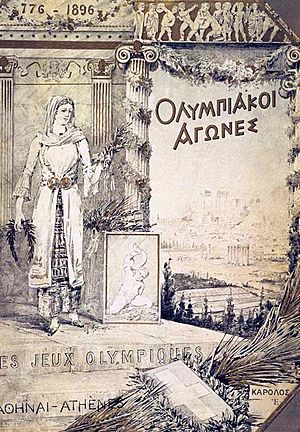Olive wreath facts for kids

The olive wreath, also called kotinos, was a special prize. It was given to the winners of the Ancient Olympic Games. This wreath was made from a branch of a wild olive tree. This specific tree, called Elaia Kallistephanos, grew at Olympia. The branches were twisted into a circle or a horseshoe shape.
Branches for the wreaths came from a sacred wild-olive tree. This tree grew near the temple of Zeus. A special boy, called a pais amphithales, cut the branches. This boy's parents both had to be alive. He used golden scissors for this important task. Then, he took the branches to the temple of Hera. There, they were placed on a table made of gold and ivory. The Hellanodikai, who were the judges of the Olympic Games, would then take these branches. They would make the wreaths and place them on the heads of the winning athletes.
History of the Olive Wreath
The olive wreath has a long and interesting history. According to an ancient writer named Pausanias, the hero Heracles first introduced it. He made it a prize for the winner of the running race. This was done to honor his father, Zeus.
In the ancient Olympic Games, there were no gold, silver, or bronze medals. There was only one winner for each event. This winner was crowned with an olive wreath. These wreaths were made from the leaves of a sacred wild-olive tree. This tree grew near the Temple of Zeus in Olympia.
The olive wreath is still important today. It connects the modern Olympic Games to their ancient past. For example, the 2004 Summer Olympics were held in Athens, Greece. Olive wreaths were given out to winners there. This was done to honor the ancient tradition. The olive wreath was also part of the official symbol for those games.
The ancient writer Herodotus tells a story about the olive wreath. The Persian king Xerxes was questioning some Arcadians. This happened after the Battle of Thermopylae. He asked why so few Greek men were defending Thermopylae. The Arcadians replied, "All other men are participating in the Olympic Games." Xerxes then asked, "What is the prize for the winner?" The answer was simple: "An olive-wreath."
One of Xerxes' generals, Tiritantaechmes, was amazed. He said, "Good heavens! Mardonius, what kind of men are these against whom you have brought us to fight? Men who do not compete for possessions, but for virtue." This shows how highly the Greeks valued honor over material wealth.
The ancient Greek writer Aristophanes also joked about the olive wreath. In his play Plutus, he made a funny comment. He wondered why Zeus, who founded the Olympics, only gave wild olive wreaths. He thought if Zeus were rich, he would give gold instead.
Victorious athletes were greatly honored. People celebrated them and praised their achievements. Their deeds were written down for future generations. In fact, the names of Olympic winners helped create the timeline of the ancient world. This was put together by Timaeus in his work, The Histories.
The olive wreath is also mentioned in other cultures. The first line of the Mexican national anthem talks about it. It asks the country to keep the olive wreath around its "temples." This wreath was given by a holy archangel. It suggests that God himself has planned the country's future.
See also
 In Spanish: Corona de olivo para niños
In Spanish: Corona de olivo para niños
- Olympic medal
- Ancient Olympic Games
- Olive branch
- Laurel wreath
- Klila, myrtle wreath in Mandaeism
- Wreaths and crowns in antiquity
 | Anna J. Cooper |
 | Mary McLeod Bethune |
 | Lillie Mae Bradford |



